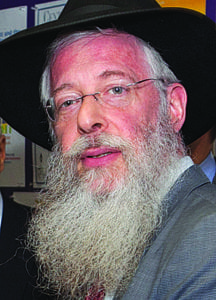In the Passover story, the Jews were faced with the sea on one side and the Egyptian army on the other.
“Let’s fight,” some cried.
“Let’s surrender,” others said.
“Let’s pray,” still others advised.
But Moses said, “Now is not the time to fight or surrender or even to pray. Journey onward, and we will soon see the salvation of G-d.”
Another story is told about scientists warning that in one month a meteor would hit the earth, causing the iceshelf to shift and water to flood the entire world.
People around the world wondered how best to utilize the remaining days until the impending crisis. Some suggested spending their last days with their families. Others thought to use them to get their affairs in order with friends and acquaintances. Still others called for days of mass prayers.
But in Israel, the Jews gathered, and then one stood to speak.
“Brothers and sisters,” he said, “we have only one month to learn how to breathe underwater.”
Whatever happens, we need to journey onward.
The first thing Moses taught the newly freed Jewish nation after crossing the sea was that freedom is based upon remembering “to care for the stranger, for you were strangers in the land of Egypt.” In fact, this lesson is repeated over 30 times throughout the Bible. G-d wanted us to realize a fundamental imperative: We were slaves in a foreign land; be considerate and care for others in need.
This past year with COVID-19, we were all somewhat like strangers. We did not meet with each other face to face. We did not eat with each other, celebrate with each other or even mourn with each other. Rich or poor, young or old, we were all like strangers in a strange place. If we then have become “the strangers,” what tangible thing can we do to help each other?
I think there are many answers, but I will focus on just two of them:
First, consider the upcoming holiday of Passover. There are many people in this community who will be physically alone for the seder this year. Will they have what they need to make a seder? Most everyone will probably know of at least one or two people who may not have ever prepared a seder plate and could benefit by receiving everything they need to make their own. I am suggesting you help them.
How else can we fulfill this fundamental teaching of reaching out to the stranger in this unprecedented time in which we all are the strangers? Journey onward – with compassion and caring – and lend a hand to those in need. It is imperative in this moment in time to recognize that lots of people are going through a tough time. Reach out with empathy, with caring, with a smile and with a kind word. To use a phrase that Kentucky Governor Andy Beshear has coined, “We’re going to get through this; we’re going to get through this together.”
Passover is the holiday of our freedom. Moses taught that true freedom requires our caring for all others. Only then can we sit with our families and pray for the coming of Moshiach and the day when G-d will bring healing and peace and goodness to the entire world with the resounding prayer: Next year in Jerusalem.
(Rabbi Avrohom Litvin is the regional director of Chabad of Kentucky.)



